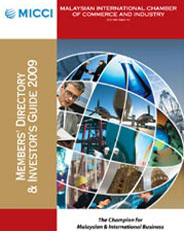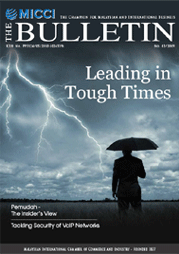KEYNOTE ADDRESS FOR
YB DATO’ MUSTAPA MOHAMED
MINISTER OF INTERNATIONAL TRADE AND INDUSTRY MALAYSIA
AT MICCI’S AGM AND ANNUAL LUNCHEON
16 JUNE 2009
SIME DARBY CONVENTION CENTRE
Ms Irene Dorner,
MICCI new President 2009/2010
Dr Rajah Kumar,
MICCI past President 2008/2009
- First and foremost I would like to thank the Malaysian International Chamber of Commerce and Industry for inviting me to this annual event. While I have had the pleasure of meeting some of you at other occasions, this is the first opportunity I have, as Minister of Ministry of International Trade and Industry, to meet the wider membership of the international business community in Malaysia.
- I am privileged to be a member of the new Cabinet. We are just over two months old, but as the Minister of International Trade and Industry, I can assure you that the Government will continue with its pro-business policies and undertake continuous efforts to make Malaysia the most attractive destination for doing business in the region.
- Like governments elsewhere, Malaysia has undertaken concerted efforts to address the global economic crisis through the implementation of the RM67 billion stimulus packages. The measures outlined in the stimulus packages not only focus on stimulating the economy in the short-term, but also on building long-term economic capacity. This will ensure that Malaysian businesses will be well placed to seize the opportunities when the global economy recovers.
- Malaysia is fortunate that we were relatively insulated from the first phase of the global crisis which affected the financial sector. This is the result of prudential measures put in place in the financial sector following the 97-98 Asian financial crisis. It demonstrates Malaysia’s approach of maintaining a pragmatic balance between the market forces and prudent regulations to ensure an open and stable business environment is maintained.
Ladies and Gentlemen, - As the 21st largest exporting nation in the world, Malaysia is naturally impacted by the global economic slowdown and decline in world trade. This has not diminished our vision to be among the top 10 trading nations in the world. Our drive to attract FDIs will remain a priority. Malaysia is one of the most globalised economies in the world and the Government will continue to pursue policies that enhance our integration and competitiveness in the world economy.
- Our efforts saw Malaysia’s competitiveness ranking improve to the 18th position from 19th last year, among 57 economies in the ranking released by the Swiss-based Institute for Management Development or IMD in its World Competitiveness Ranking 2009. The improvement is brought about especially through improvement in Business Efficiency.
- Among countries with population over 20 million, Malaysia is ranked as the 6th most competitive nation, after the US, Australia, Canada, Germany and Japan. The Government will continue the winning formula of maintaining business-friendly policies and wants to collaborate with the private sector to identify further areas for improvements.
- PEMUDAH, Malaysia’s unique public-private sector collaboration to drive efficiency, will continue to initiate improvements in the delivery systems, particularly by removing impediments and facilitating business operations. PEMUDAH now, not only addresses business concerns, but also the wants to improve service delivery for the man in the street. This is because the government is aware that the culture of efficiency must be the norm in all aspect of society.
- The e-Payment system, the Business Licensing Electronic Support System (BLESS) and the implementation of pre-clearance of Cargo (document verification), based on Estimated Time of Arrival (ETA) by the Malaysian Customs, which has reduced time taken for clearance process to a day from 3 days previously, are among notable measures implemented under PEMUDAH stewardship.
- As part of the measures to enhance efficiency of the business environment, the Government has since 1 December 2008 implemented automatic issuance of manufacturing licences for all industries, except for activities related to security, safety, health, environment and religious considerations. Approval for operation of Representative Offices and Regional Offices has now been extended to five years, compared with three years previously.
- For 2009, among the initiatives being pursued by PEMUDAH include creation of a Single Corporate Identity Number, known as MyCoID (My Company Identification), for all business transactions, including registering and closing a business, establishment of an Independent Commercial Court (in collaboration with the Judiciary and the Legal Affairs Division of the Prime Minister’s Department), as well as publishing a guidebook on Industrial Relations and Asset Search Directory.
- Feedback from the business community such as the MICCI is very much welcomed in the Government’s efforts to enhance business efficiency.
- The Government is formulating a new economic model. The Government has established the National Economic Advisory Council to drive new growth strategies in transforming the economy and to move up the value chain. The major agenda of the Council is the formulation of a high-income growth model. In this regard, feedback from all of you is most welcome and will be valuable inputs in formulating this new economic model for Malaysia.
- The Government recognises that the manufacturing sector will continue to assume a very important role as engine of growth but competition requires that we move up the value-chain. We also recognise that the services sector needs to assume an increasing role in the new economic model. As such the government is serious in its intent to promote the development of the services sector, both as a facilitator to the manufacturing industry, as well as a contributor to greater economic growth. The liberalisation of the 27 services sub-sectors in the areas of health and social services, tourism, transport, business services and computer and related services, announced in April 2009, is a step in this direction. We want to collaborate with established services industries in the world to ‘leap-frog’ the development of the services sector but also tap into the regional markets.
- The move to liberalise the services sector is expected to also result in increased investments, inflow of specialised expertise and technology into the sector, allowing opportunity for Malaysian companies to build capacity and competitiveness and enter into the regional and global markets. Business entities such as MICCI are most welcome to forward further proposals for liberalisation that could encourage further investments and spur growth and development of the services sector.
- The crucial role of the small and medium enterprises (SMEs) in economic development has been well documented. The development of the SMEs will remain a key area that needs further intensification.
- The Government has implemented the Industrial Linkage Programme (ILP) as part of efforts to accelerate the integration of Malaysian SMEs into the global supply chain and enhance their ability to be suppliers to large companies and multinational corporations (MNCs).
- In 2008, a total of 859 SMEs became suppliers to MNCs, GLCs and large companies, generating cumulative sales totalling RM893.79 million. I would like to see more MNCs participate in this programme to assist in strengthening the domestic industry and to develop SMEs into reliable suppliers of parts and components, products and services.
- On our part, the Government has introduced the SME Competitive Rating for Enhancement (SCORE) to rate the capabilities of SMEs, making it easier to identify good and reliable SMEs to be potential suppliers to MNCs.
- Malaysia will pursue actively an open trade and investment regime in ASEAN. The ASEAN Free Trade Area (AFTA) offers a market consisting of a combined population of more than ½ a billion people. Until 2005, ASEAN’s economic focus was on the liberalisation of trade in goods. Measures towards economic integration took on an ad-hoc, add-on manner rather than evolving from a concrete concept plan for regional integration. In 2005, the ASEAN decided that economic integration is a priority and made the commitment to establish the AEC by 2015.
- Global economic developments made economic integration the only option if the region was to be competitive and remain an attractive destination for Foreign Direct Investment. The AEC Blueprint, an ambitious plan for economic integration, drawn up in 2007 provides a structured approach for achieving the goals of the AEC. The AEC covers all aspects of economic integration, from tariff reduction and elimination, to services, investments, standards, customs cooperation and other economic sectors. It also covers initiatives to narrow the development gap between ASEAN Member States so as to enable equal opportunities and benefits in the process of ASEAN integration and community building.
- Malaysia is strong supporter of multilateral trading system under the WTO. Unfortunately progress has been slow. As a result FTAs have become the second best option. Malaysia will continue to pursue FTAs both regionally together with ASEAN partners and bilaterally. Malaysia and New Zealand has recently concluded negotiations of the bilateral Malaysia-New Zealand FTA. We hope to resume our bilateral negotiations with US and Australian soon.
- With all these efforts, Malaysia aims to project itself as an attractive investment destination regionally and globally. Business investing in Malaysia will be positioning itself to reap the benefit of the introduction of the new economic model for Malaysia and the regional integration of ASEAN.










